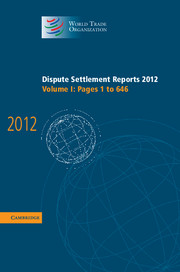Book contents
- Frontmatter
- Table of Contents
- United States – Measures Affecting Trade in Large Civil Aircraft (Second Complaint) (WT/DS353) Report of the Appellate Body
- Table of Contents
- CASES CITED IN THIS REPORT
- ABBREVIATIONS USED IN THIS REPORT
- I INTRODUCTION
- II ARGUMENTS OF THE PARTICIPANTS AND THE THIRD PARTICIPANTS
- III ISSUES RAISED IN THIS APPEAL
- IV THE MEASURES AT ISSUE
- V PROCEDURES UNDER ANNEX V TO THE SCM AGREEMENT
- VI NASA PROCUREMENT CONTRACTS AND USDOD ASSISTANCE INSTRUMENTS
- VII NASA/USDOD ALLOCATION OF PATENT RIGHTS – SPECIFICITY
- VIII WASHINGTON STATE BUSINESS AND OCCUPATION (B&O) TAX RATE REDUCTION
- IX CITY OF WICHITA INDUSTRIAL REVENUE BONDS (IRBS) – SPECIFICITY
- X ADVERSE EFFECTS
- XI FINDINGS AND CONCLUSIONS
- ANNEX I NOTIFICATION OF AN APPEAL BY THE EUROPEAN UNION
- ANNEX II NOTIFICATION OF AN OTHER APPEAL BY THE UNITED STATES
- ANNEX III PROCEDURAL RULING AND ADDITIONAL PROCEDURES TO PROTECT SENSITIVE INFORMATION
- ANNEX IV PROCEDURAL RULING AND ADDITIONAL PROCEDURES ON THE CONDUCT OF THE ORAL HEARING
- ANNEX V HSBI ANNEX
- Cumulative List of Published Disputes
VII - NASA/USDOD ALLOCATION OF PATENT RIGHTS – SPECIFICITY
Published online by Cambridge University Press: 13 December 2017
- Frontmatter
- Table of Contents
- United States – Measures Affecting Trade in Large Civil Aircraft (Second Complaint) (WT/DS353) Report of the Appellate Body
- Table of Contents
- CASES CITED IN THIS REPORT
- ABBREVIATIONS USED IN THIS REPORT
- I INTRODUCTION
- II ARGUMENTS OF THE PARTICIPANTS AND THE THIRD PARTICIPANTS
- III ISSUES RAISED IN THIS APPEAL
- IV THE MEASURES AT ISSUE
- V PROCEDURES UNDER ANNEX V TO THE SCM AGREEMENT
- VI NASA PROCUREMENT CONTRACTS AND USDOD ASSISTANCE INSTRUMENTS
- VII NASA/USDOD ALLOCATION OF PATENT RIGHTS – SPECIFICITY
- VIII WASHINGTON STATE BUSINESS AND OCCUPATION (B&O) TAX RATE REDUCTION
- IX CITY OF WICHITA INDUSTRIAL REVENUE BONDS (IRBS) – SPECIFICITY
- X ADVERSE EFFECTS
- XI FINDINGS AND CONCLUSIONS
- ANNEX I NOTIFICATION OF AN APPEAL BY THE EUROPEAN UNION
- ANNEX II NOTIFICATION OF AN OTHER APPEAL BY THE UNITED STATES
- ANNEX III PROCEDURAL RULING AND ADDITIONAL PROCEDURES TO PROTECT SENSITIVE INFORMATION
- ANNEX IV PROCEDURAL RULING AND ADDITIONAL PROCEDURES ON THE CONDUCT OF THE ORAL HEARING
- ANNEX V HSBI ANNEX
- Cumulative List of Published Disputes
Summary
Introduction
724. We turn now to the European Union's claim concerning the Panel's finding that, on the assumption that the allocation of patent rights under the contracts and agreements between NASA/USDOD and Boeing constitutes a subsidy under Article 1.1 of the SCM Agreement, it would not be specific within the meaning of Article 2.1 of that Agreement. We provide a summary of the Panel's findings in section B. Next, we discuss the Panel's arguendo approach in section C. The European Union's claims on appeal are assessed in sections D, E, and F.
725. Before proceeding, we wish to clarify three aspects about the scope of the appeal that is before us. First, we note that, before the Panel, the European Communities challenged: (i) the allocation of patent rights under NASA/USDOD contracts and agreements; and (ii) the allocation of rights over the data produced under the relevant NASA/USDOD contracts and agreements. The Panel rejected both claims. The European Union's appeal is directed only at the Panel's finding concerning the patent rights and does not include the Panel's finding on the data rights. This was confirmed by the European Union during the oral hearing.
726. Second, we observe that the European Communities challenged the patent rights allocation under NASA/USDOD contracts and agreements independently from its challenge to the payments and other support provided to Boeing under certain NASA/USDOD contracts and agreements.
- Type
- Chapter
- Information
- Dispute Settlement Reports 2012 , pp. 321 - 351Publisher: Cambridge University PressPrint publication year: 2014



